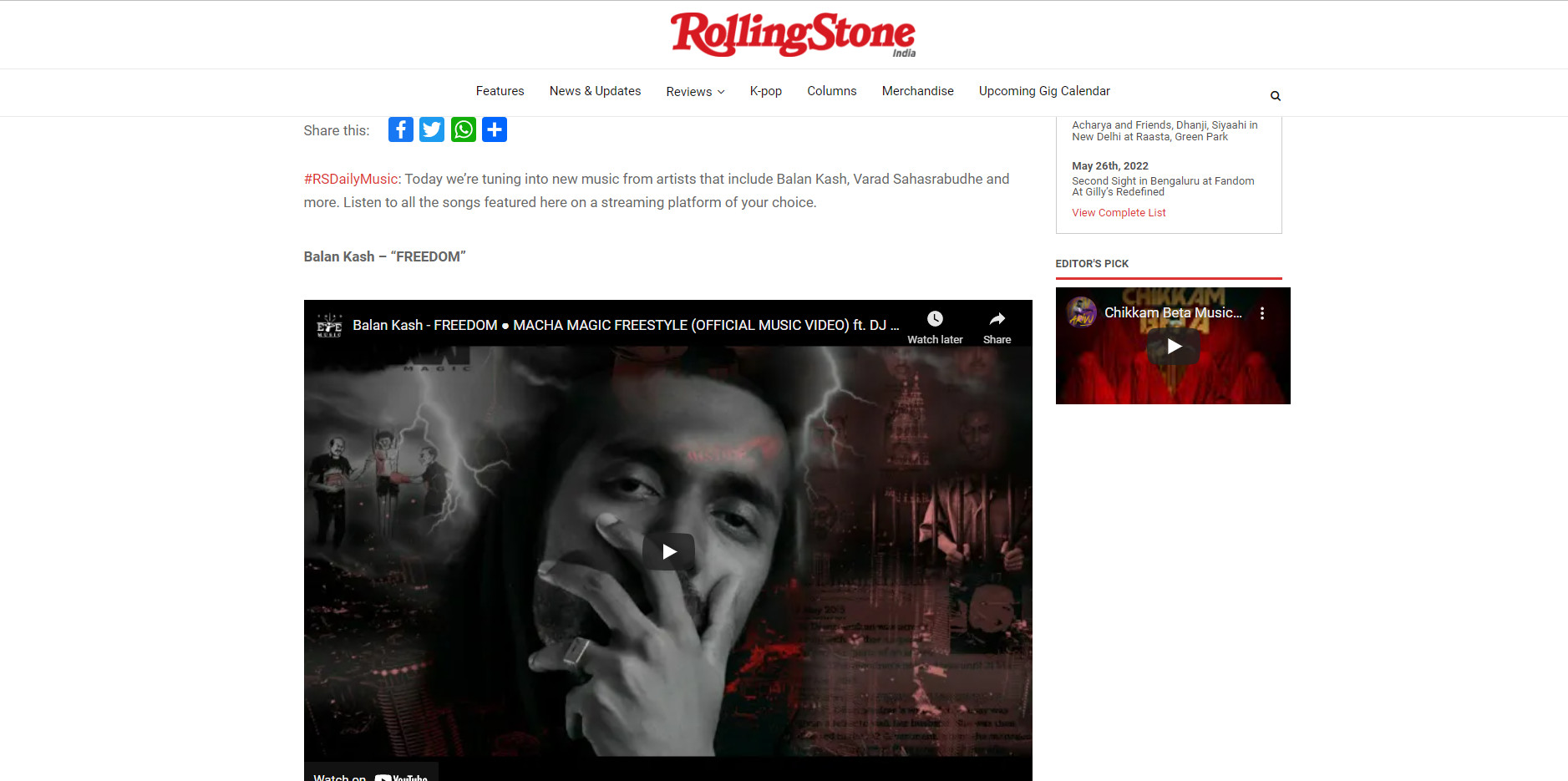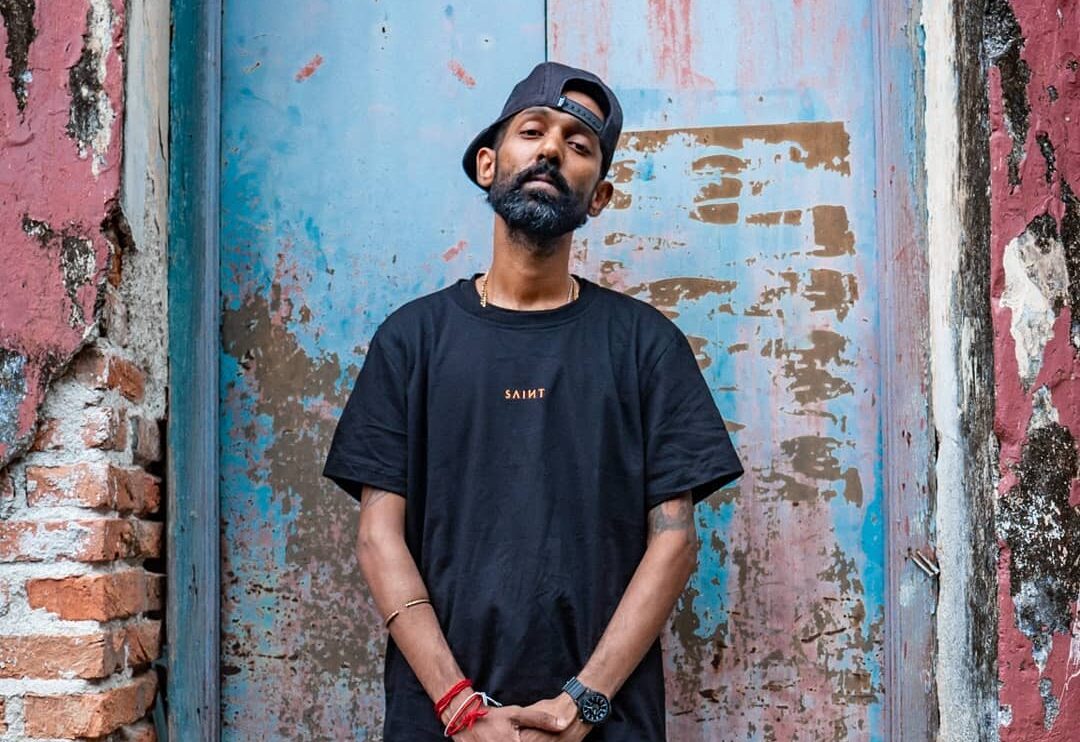Balan Kash never expected his song “Freedom-Macha Magic Freestyle” featuring DJ Uno to be featured in Rolling Stones India when he originally released it. The song has earned a lot of appreciation from the public, and properly so, because of the truth in his words, which emphasises the modern issues facing the Malaysian Indian population.
Balan Kash who has released other hit singles like “Start That Thiruvizha” definitely does not need an introduction, especially to those familiar with the Malaysian rap scene, is due to release an album titled “Terima Kasih” on 9th July. However, before he could even release it officially along with the whole album, “Freedom-Macha Magic Freestyle” has already surpassed milestones and has become the talk of the town.
We recently spoke with the inspirational hitmaker about his next album, the inspiration behind the title, his experience working with DJ Uno, and some of the societal challenges when it comes to our country and the Malaysian music industry in general. Continue reading to find out all the details.
1. With your upcoming album “Terima Kasih”, are you planning on branching into the local music scene?
I feel as a Tamil rap musician, the options are very limited. Because I only have one radio station, which is Thr Raaga. And then I only have like one big TV station, which is Astro. And it limits your creativity when in reality, there should be no boundaries to it.
Even though I do English music, I speak English and everything, I still felt that as a true Malaysian, the only way for me to reach my art to everybody is by making Malay music. As much as I can ignore it, and try to put it off, in the end there’s no other way about it. You have to do your national language. And I don’t think a lot of Tamil singers in this country have thought about it that way because they always say I did it because “oh it’s my ticket to stardom.”
But no. I think by including your national language you’re also trying something that can be heard by a whole different spectrum of audience at the same time. You know, we’re so broken. I think a song could actually bring you together with people.
2. Can you share with us the inspiration behind the album? Why is it called “Terima Kasih”?
My daughter was born in 2018, and I was talking to a composer, and I told him my daughter was crying. I said “Bro, I can’t talk music right now, I just became a dad.” And then after a while, he sent me a bit with my daughter’s voice on it and I just wrote a rap on it, but the chorus I wrote ‘Terima Kasih kepada semua’. And I’m not a singer but I still had this track just existing, didn’t do much about it when it was done. Then I think around 2020 I was like, okay, I’m about to do this, but then covid happened.
I shared it with a few friends and a big mentor to me, which is Altimet. He works closely with my company, and my composer Navin. So he heard the song and he said “I think there’s very huge potential for this song and I think you should really take the song seriously. I will assist in making the song happen.” That’s when we were like, okay, you know what? Let’s finish this song up and make it the first single and yeah, that’s how we got inspired. But it’s also being in covid when I wrote the song, it was me saying I’m thankful that I have a roof above my head, I have food to eat, I have great family, what can I complain about?
3. So the album itself, it highlights several social issues, right?
Yeah. How often do you see Tamil boys or girls being highlighted in English or Malay media? It’s so one-sided. And the system has been that way for so long and if we don’t work towards changing it, then what’s going to happen with the coming generation? So the songs were all pretty much like the first one that came out. Why I did so is because firstly, my passion is in hip hop but at the same time, I wanted to speak on all the things people are uncomfortable to speak about. Like justice for Ganapathy, student quotas. They’ve been going on in this country for decades and there’s been nobody to address it.
So that is what I wanted to achieve with the album; to speak about all the things that we can ponder about as a whole country together and not just as a separate communities. But at the same time, I have the responsibility to make music that could potentially educate somebody else and helps them be more aware of what’s happening in our community. Because when George Floyd happened, we all had the black screen post on our Instagram and Facebook, but how come the energy isn’t the same when it happens in our country? As bitter as it sounds, that’s the actual truth of what’s happening.

4. So for the next question, amongst the big names who you’ve collaborated with is DJ Uno from Pop Shuvit. Can you share your experience working with him?
I’ve known DJ UNO since I was a young boy, I used to rollerblade with him. He’s like my big brother from my neighbourhood. And all us young boys in school watched him become a DJ, carrying turn tables and all that, so we were starstruck. We see him on TV and we’re like, damn. But at the same time, he’s just your brother. He’s still the same guy.
But what he did for us was that wherever he went, he picked us up. If there was an opening at a show, he’d ask if we want to perform. It was like a paying forward kind of thing. Somebody did it for him and now he does the same for us. So because of that, i’ve travelled with him for more than 20 years as an adult.
So when I was mkaing the song, I sent it to him. I told him to take a listen, tell me what he thinks. And he was like “you sound so mature, you sound so content, and it doesn’t sound like what you used to do ten years ago. It sounds like an adult and there’s a lot of reasoning in your statements. I’m very proud of you.” Then I asked if he can be on the song, and he’s like, why? I told him that this was my way of paying homage to my OG. Then he said he’d be honoured to.
So I wanted to open my album with my Klang OGs, since i’m a Klang boy. To me, it was a fanboy moment because I got to do something with my high school hero. And he really is a hero to a lot of people, he’s achieved things a lot of people would die to achieve. But he’s going to be there at my launch. He’s going to perform with me. So I take that as a big honour. I get to perform with my childhood hero.
5. In terms of collaborations, we often see contemporary hip hop artists working with other more well-known artists. If you were to pick a few, who would you pick?
I think I will always give this same answer. The five people that I’ve always wanted to work with in this country, in no specific order is; my mentor Joe Flizzow, Altimet, Malique, Yogi B and David Arumugam. This is the ‘male list’ for people I want to work with. But if it’s women, it’s always been two women. I’ve never changed this opinion since high school. Two Malaysians; one is Siti Nurhaliza, and one is Jaclyn Victor.
6. What did you learn from the “Terima Kasih” album?
Patience. And never try to take credit for having it, because God will find his own way to repay you. I learnt that because I got a lot of things done for this album in a very easy manner because of things that I’ve done in the past. It felt like a full circle moment. I have a lot of patience because I had to convince and prove to a lot of people, so that they could understand what I was trying to do. Because ‘Terima Kasih’ is not me just trying to break into the market of Malay songs. If these songs make it big, it opens the door for so many other Indian boys out there. That is what I’m trying to achieve.

7. You were featured in Rolling Stones, India. How do you feel about that?
Lucky, grateful, it’s such an establishment. The thing is, there was a writer like you over there who heard the song, watched the video and thought “yo this song is dope, I’m gonna put it on our daily pick.” At first I thought it wasn’t such a big deal, until I saw their daily picks, which included major records in their picks. So they’re basically putting you on the same pedestal as the people that you look up to. That feels really good.
And then coming from Malaysia, where it’s so difficult to make a Malay song in this country, especially when you’re not a Malay… The options are extremely limited because the media is so Kpop and Hollywood orientated. We will write all about Drake, but we wouldn’t write about SonaOne or Joe Flizzow if they were making English songs. However, if they made Malay songs, we’d write about it immediately.
So it felt good when that happened. When I got the email, I was like wow, Rolling Stone. Being someone who grew up reading the magazine, getting that from them was a big deal. It’s a small win but it’s a big deal to me. So achieving that allowed me to achieve stuff like this interview right now. Now the media here is like, okay, if it can be picked up by a magazine as established as The Rolling Stone, then there must be something about this artist that we missed out.
While waiting for the full album to drop, check out the MV for “Macha Magic Freestyle” here:

Follow us on Instagram, Facebook or Telegram for more updates and breaking news.



